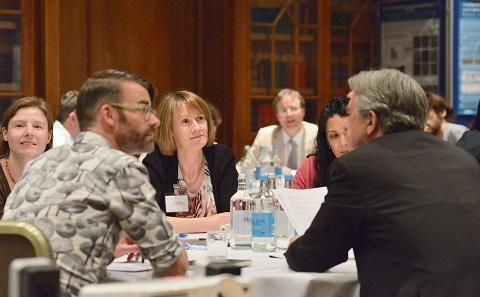Global-NAMRIP Virtual Conference Event

- Time:
- 09:15 - 16:15
- Date:
- 10 June 2021
- Venue:
- Online conference (via TEAMS)
For more information regarding this event, please email Yvonne Richardson at Y.Richardson@soton.ac.uk .
Event details
Join us to celebrate how Global-NAMRIP members have been tackling the issue of AMR and Infection Prevention, against the backdrop of a global pandemic.
To register for the event and receive details on how to join the conference, please email Y.Richardson@soton.ac.uk
As part of the event, we invite PhD students (who have not yet passed their final viva) to present their AMR related research project in 3 minutes (following the rules laid out in Appendix 1). Prizes will be awarded (First prize: £500, Second prize: £100, Third prize: £50, all Amazon vouchers). To request entry to the 3 Minute Thesis (3MT) competition, please email Y.Richardson@soton.ac.uk with the title of your 3MT. Entries will cease when all the timeslots are filled.
Programme (All times are British Summer Time, BST / UTC +1)
Speakers are from the University of Southampton, unless shown otherwise.
- 09:15 – 09:30 Professor Timothy Leighton, Chair of Global-NAMRIP: Introduction
Global-NAMRIP (Part 1)
- 09:30 – 09:45 Professor Alex Hughes (Uni of Newcastle), Dr Emma Roe, Elvis Wambiya (APHRC), Dadirai Mkombe (Uni of Malawi), Dr Abhalah Ziraba (APHRC) and Prof Alister Munthali (Uni of Malawi): Changing Food Systems in Kenya and Malawi and the Challenge of Tackling Antimicrobial Resistance
Sensing and diagnostics
- 09:45 – 10:00 Dr Collin Sones: Diagnosing Urinary Tract Infections using laser-patterned paper-based tests
- 10:00 – 10:15 Dr Parwez Hossain: Using point of care imaging in the diagnosis of corneal infections
- 10:15 – 10:30 Dr Stephen Poole: Clinical impact of molecular point-of-care testing for suspected COVID-19 in hospital: A prospective, interventional, non-randomised, controlled study (COV-19POC)
- 10:30 – 10:45 Dr Callum Highmore: Novel Raman Spectroscopic Analysis for In Situ Detection of AMR in Cystic Fibrosis
- 10:45 – 11:00 3MT Competition
- Weng Yee (Beverly) Chong: Investigating ways to improve food safety: Ultrasonic salad cleaning
- Nichola Jones (University of Leeds): Gender and AMR: What can we learn by applying a gendered lens to data analysis?
- 11:00 – 11:15 Break
Global-NAMRIP (Part 2)
- 11:15 – 11:30 Timothy Kayondo (Aqua Methods, Uganda): Providing safe drinking water within rural Uganda
- 11:30 – 11:45 Dr Nazarius Tumwesigye (Makerere Uni): Efforts against AMR in the last 12 months of COVID-19 in Uganda
- 11:45 – 12:00 Dr Henry Kajumbula (Makerere Uni): Difficult to treat Gram-Negative Rods: A Ugandan Perspective
- 12:00 – 12:30 3MT Competition
- Stephen Poole: Novel molecular diagnostics improve antibiotic use in critically ill patients with pneumonia: results from a randomised controlled trial
- Siya Aggrey (Stellenbosch University): Invasion meltdown through antimicrobial resistance: the case of invasive House Crows (Corvus splendens) in Cape Town
- Ravi Kant (University of Delhi): Combating the global AMR challenge by targeting Glutamate racemase (MurI) from the cell wall biosynthesis pathway of Neisseria gonorrhoeae : A computational approach
- 12:30 – 13:30 Lunch
Pharmacology and Therapeutics
- 13:30 – 13:45 Dr Ali Mosayyebi: Involving patients and public in developing a novel, infection-resistance ureteric stent
- 13:45 – 14:00 Dr Sammer Hassan, Professor Xunli Zhang: Microfluidics technology for tackling AMR
- 14:00 – 14:15 3MT Competition
- Fatumah Atuhaire: Will a rapid diagnostic test influence the number of Buruli ulcer cases?
- Bethany Martin (UoS/Public Health England): Bacterial impedance cytometry for rapid antibiotic susceptibility testing
Behaviour in the wider world
- 14:15 – 14:30 Dr Merlin Wilcox: Retrospective Survey of Prevention, Treatment, Occurrence and Outcomes of Covid-19 in the community (RTO-Covid-19)
- 14:30 – 14:45 Professor Lucy Yardley (Uni of Bristol/Uni of Southampton): Behavioural advice and support for reducing transmission of Covid-19 in the home
- 14:45 – 15:00 Break
Infection Prevention
- 15:00 – 15:15 Professor Paul Elkington: Development and deployment of the Personal Respirator Southampton (PeRSo) during the COVID-19 pandemic
- 15:15 - 15:30 Dr Tom Secker: Improving surgical instrument decontamination using cold water and sound
- 15:30 – 15:45 Dr Emma Roe, Dr Charlotte Veal (Uni of Newcastle), Dr Sandra Wilks, Dr Paul Hurley: Routes of infection, routes to safety: Creative mapping of human-viral behaviours on the bus to understand infection prevention practices
- 15:45 – 16:00 Dr Christopher (Kit) Harling: The Liquid Acoustic Wound Stream: How do you conduct the First-in-Patient trial?
- 16:00 – 16:15 Professor Timothy Leighton: Closing remarks & Prize giving
Appendix 1: Rules of the 3 Minute Thesis (3MT) competition
- Two slides are allowed, the first showing only the title of the topic, the name and affiliation of the presenter, and any logos for the host institution, collaborators and sponsors, and a clear statement of what year of study for the PhD the student is in. This should be followed by a single static PowerPoint slide. In both slides there should be no animations or 'movement' of any kind.
- No additional electronic media (e.g. sound and video files) are permitted.
- No additional props (e.g. costumes, physical models, printouts, laboratory equipment) are permitted.
- Presentations are limited to 3 minutes maximum and competitors exceeding 3 minutes are disqualified.
- Presentations are to be spoken word (e.g. no poems, raps or songs).
- Presentations are considered to have commenced when a presenter starts their presentation by introducing themselves and their topic in speech, which is the first thing they should do.
- The decision of the adjudicating panel is final.